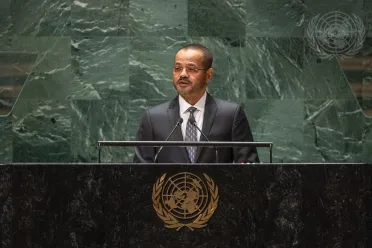Statement
Statement summary
SAYYID BADR BIN HAMAD BIN HAMOOD ALBUSAIDI, Foreign Minister of Oman, said dialogue is a core principle and effective approach of the country’s foreign policy, which is based on peace and reconciliation between nations. He reaffirmed Oman’s deep attachment to the international community and a system based upon peace, justice, international order and respect for international law. He also supported the sovereignty of States and non-interference in international affairs. He appealed to the international community to stay committed to the United Nations and settle disputes through dialogue and negotiation, as this will serve as a path for a world of prosperity, dignity and security.
Voicing support for all fair and just causes, he said the Palestinian plight is an injustice that has lasted more than 70 years. The Palestinian people stand firm despite the brutal Israeli occupation and its violation of international law and Council resolutions. The United Nations has a moral and legal duty to find a fair, equitable solution that ends their suffering and restores their legitimate rights. He called for Israel’s withdrawal from the territories occupied since 1967 and the creation of an independent Palestinian State with East Jerusalem as its capital. Turning to the Ukraine conflict, he said that, in addition to the humanitarian fallout, the conflict has created significant challenges to international peace and the proper functioning of supply chains around the world. He invited the parties involved in the conflict to begin peace negotiations.
Turning to his country’s work on climate change, he said Oman has a plan to encourage investment in renewable energy projects, based on a strategy of zero carbon emissions between now and 2050, and it will actively participate in the twenty-eight Conference of the Parties to the United Nations Framework Convention on Climate Change (COP28) in November. The Oman Vision 2024 focuses on sustainable development and modernizing the country’s education system. “Education is key to promoting the development of people and [ensuring] they can contribute to economic development,” he said. Condemning all acts that incite violence or hatred and lead to discrimination, based on religion, creed or race, he called on the international community to adopt legislation and criminalize these acts, which are threats to the national security of States and society. Today’s complex global challenges, including climate change, global epidemics, the trafficking of human beings and conflicts, require global cooperation. The principles of international law must be implemented without any double standards.

